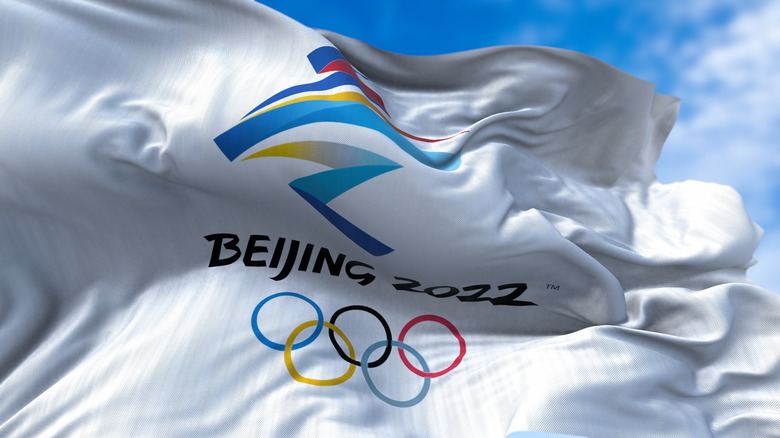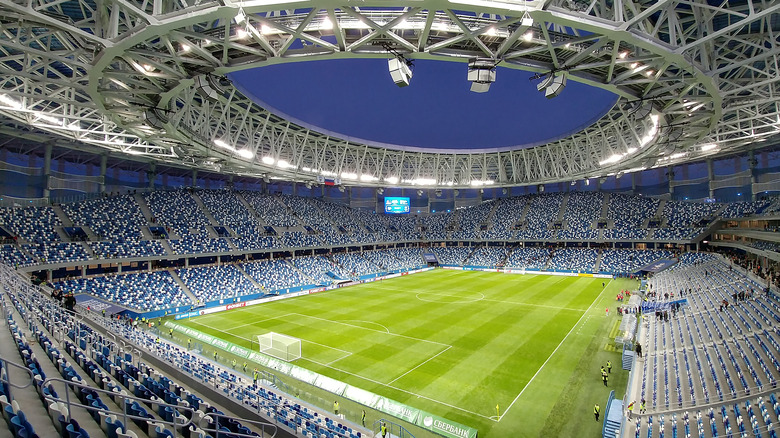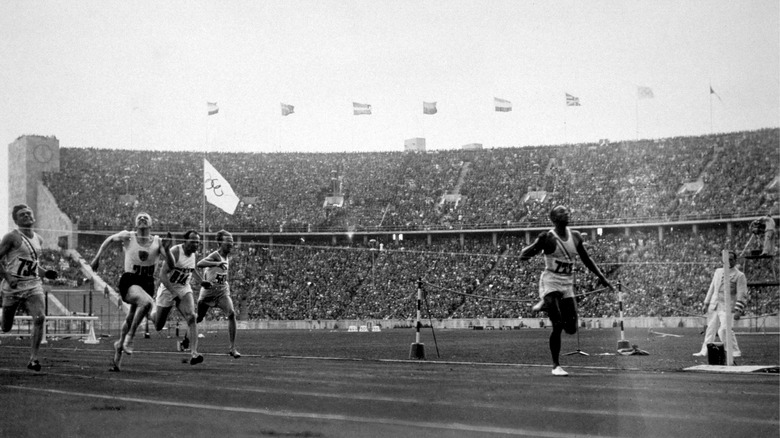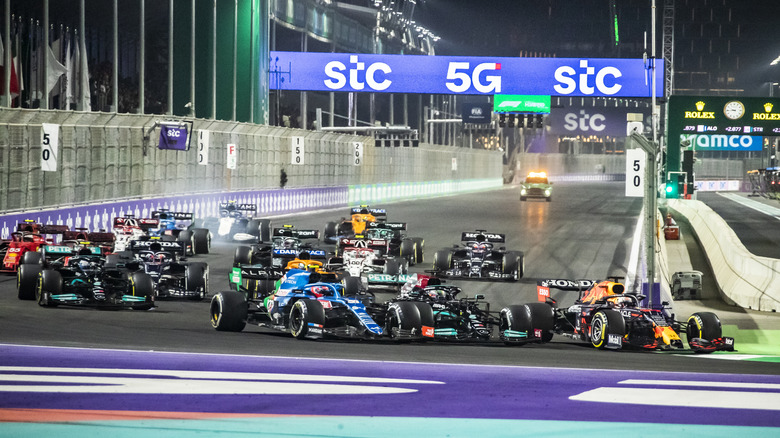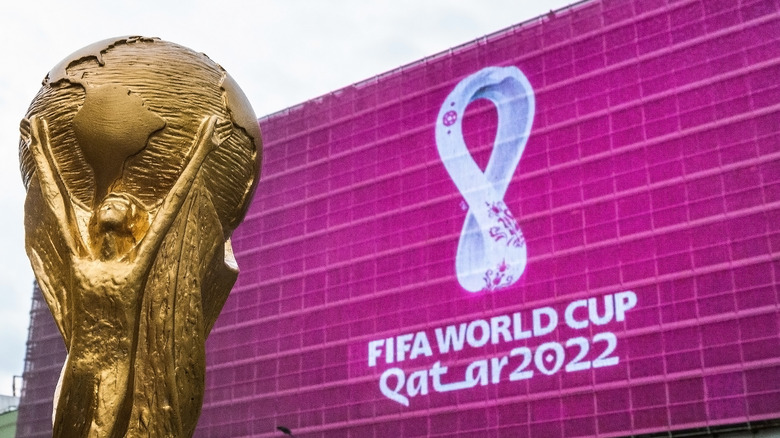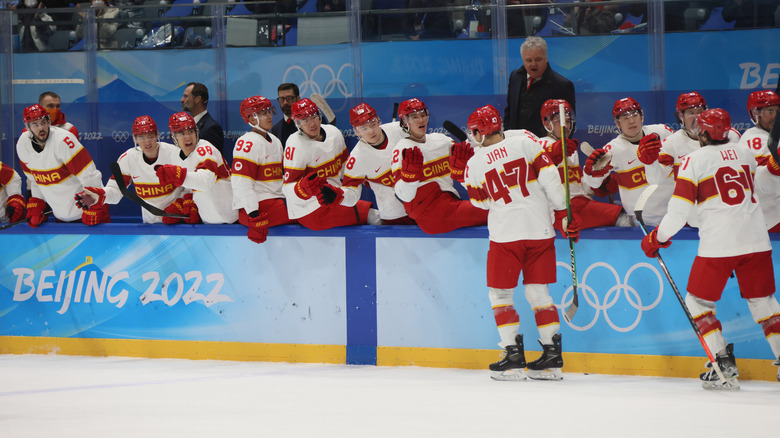What Is Sportswashing?
No matter how much some fans would prefer to keep their politics and sports separated, the truth is they're inextricably linked. Sports are a powerful messaging tool to show off a nation's wealth, power, and skill on the field, court, pitch, or rink.
Sporting success is sometimes viewed as a display of strength and a way of asserting dominance, and some nations will go to extreme lengths to achieve it. Russia, for instance, found itself banned from international competitions after a state-sponsored doping scandal was revealed in 2016. According to the Commission on Security and Cooperation in Europe, sports have a major influence on politics in Russia, and the nation's success at the 2014 Winter Olympics — which were held in the Russian city of Sochi — was a major boost to Russian President Vladimir Putin's approval ratings.
Meanwhile, sports and sports-related matters have even popped up on political platforms. Sport And Dev reported that politicians in Malaysia have appealed to sports fans by adding the prospect of new stadiums as campaign promises.
There's another way that governments use sports to fix or build up their image: sportswashing.
Sportswashing is a new term, but an old concept
Sportswashing occurs when a country either hosts or participates in a high-profile sporting event in an attempt to draw attention away from other, often humanitarian issues, like human rights abuses. The word has drawn a lot of attention in recent years thanks to a few examples of countries using events like the Olympics or the FIFA World Cup to shine positive attention on their country, with flashy new stadiums and venues or on-field success that works as political sleight of hand intended to make the rest of the world focus on something positive.
The Guardian credits Amnesty International with popularizing the term sportswashing in 2018, and while there are many modern examples of it, the idea and implementation of sportswashing are much, much older. In fact, one of the most notorious examples of sportswashing predates the term by about 80 years. It happened as the world was moving toward World War II and Adolph Hitler used the 1936 Summer Olympics as a propaganda tool.
The Nazis used the Olympics as a propaganda tool
According to History, the Nazi Party rose to power in Germany in 1933. By 1936, Hitler's regime was ready to show off the power of the Third Reich, while also demonstrating what they believed to be the superiority of the Aryan race (via Olympics).
Egregious human rights violations were already taking place in Germany. Three years before the games, Hitler had issued the "Reichstag fire" decree which banned the Communist Party in Germany and put a halt to human rights in the country. According to SciencesPo, this was a direct predecessor to further measures aimed at doing away with any political opposition. Nonetheless, much of the world assembled in Berlin for the 1936 Olympic Games.
The 1936 Games were a massive production in every sense of the word. Hitler attempted to use film as another tool to shape the narrative around the Games in particular and Nazi Germany in general. Leni Riefenstahl, the director known for the propaganda film "Triumph of the Will," crafted the divisive "Olympia," which documented the games. In the years since, that film has been called one of the greatest sports films ever made, while others see it as nothing more than another cog in the Nazi propaganda machine, according to the BBC.
Fortunately, the Nazi sportswashing attempts were famously thwarted by American sprinter and jumper Jesse Owens, who won four gold medals on Hitler's home turf, hampering the narrative the German dictator was trying to craft.
Sportswashing in Saudi Arabia
According to The Guardian, in 2016, Saudi Arabian Crown Prince Mohammed bin Salman announced a plan called Vision2030, a plan intended to lower the nation's economic dependence on oil, and was also thought to offer positive changes from a social perspective.
However, what followed was a series of decisions that tarnished the Kingdom's already questionable human rights record, namely, a crackdown on those with opposing views like feminists and religious leaders. Journalists were also targeted, as seen perhaps most infamously in the murder of Jamal Khashoggi (via BBC).
One major part of bin Salman's Vision30 plan involved spending billions on bringing prestigious sporting events to Saudi Arabia, in what amounts to a textbook example of sportswashing. A 2021 report from human rights organization Grant Liberty revealed that Saudi Arabia had spent more than $1.5 billion on sportswashing. The biggest piece of this is a staggering $664 million spent on bringing major motorsport events to the country. A 10-year deal with Formula 1 to hold a Saudi Arabian Grand Prix alone carried a price tag of $650 million.
The 2022 FIFA World Cup in Qatar
The 2022 FIFA World Cup has dealt with its fair share of issues since it was announced in 2010. The tournament was the first iteration of the World Cup to be held in the Middle East, which alone caused a problem, as the intense heat during the summer — which is when the World Cup is traditionally held — meant that the month-long event had to be shifted to later in the year, when average temperatures are milder (via Sky Sports). According to The New York Times, Qatar was suspected of possibly bribing FIFA officials to host the games, something Russia was alleged to have done en route to hosting the 2018 edition of the World Cup.
Strangely, Qatar being awarded the World Cup led to more allegations of human rights violations. According to The Guardian, the country needed to launch a massive construction effort ahead of the World Cup, which included building seven new stadiums and lots of infrastructure projects. In the process, it's been reported that 6,500 migrant workers — primarily from India, Pakistan, Nepal, Bangladesh, and Sri Lanka — have died since the World Cup was announced and the preparations for it started. It's been reported that 37 of those deaths were directly related to construction on new World Cup stadiums
The 2022 Beijing Winter Olympics
According to The Guardian, it could be argued that between the World Cup in Qatar and the Winter Olympics in Beijing, 2022 could earn the unfortunate distinction of being the biggest year for sportswashing in history.
Beijing hosted the 2008 Summer Olympics, and just 14 years later the city hosted the Winter Games. However, as the Games approached there was controversy, as China was accused of placing Uyghurs — members of a predominately Muslim ethnic group living in the country's Xinjiang province — in internment camps (via The Guardian). Additionally, Chinese Tennis player Peng Shuai had gone missing before the games after accusing a high-ranking Communist Party official of sexual assault. While Peng Shuai appeared at the start of the games, many believed her statements at the time were coerced by the government.
Several countries, including the United States, United Kingdom, Canada, and Australia, announced plans for a diplomatic boycott of the Winter Games. This meant that while athletes from those countries would compete in the games, no government officials would be attending. This was a decision directly aimed at China's poor human rights record, which many felt they were trying to draw attention from by hosting the Winter Olympics.
